In Java concurrent programming, the best practices for graceful exception handling include: using try-catch blocks to handle exceptions; using the Future.get() method to handle exceptions; and using Thread.UncaughtExceptionHandler to specify a custom exception handler.

Guide to Graceful Exception Handling in Java Concurrent Programming
In a multi-threaded environment, exception handling is crucial as it prevents the application from crashing and keeps Program integrity. The following guide will cover best practices for handling exceptions gracefully in Java concurrent programming:
1. Use try-catch blocks
Handling exceptions in multi-threaded code The most basic way is to use the try-catch block:
public void handleException() {
try {
// 线程执行需要处理异常的代码
} catch (Exception e) {
// 打印异常堆栈并采取适当措施,例如退出线程
e.printStackTrace();
Thread.currentThread().interrupt();
}
}2. Use the Future.get() method
when using ExecutorService, you can handle exceptions through the Future.get() method:
ExecutorService executor = Executors.newFixedThreadPool(5);
Future<String> future = executor.submit(() -> {
// 线程执行需要处理异常的代码
});
try {
future.get();
} catch (InterruptedException | ExecutionException e) {
// 处理异常,例如重新提交任务或退出线程池
executor.shutdown();
}3. Use Thread.UncaughtExceptionHandler
Thread.UncaughtExceptionHandler Allows you to specify a custom exception handler for a thread:
Thread.UncaughtExceptionHandler exceptionHandler = (t, e) -> {
// 打印异常堆栈并采取适当措施,例如退出进程
e.printStackTrace();
System.exit(1);
};
Thread.setDefaultUncaughtExceptionHandler(exceptionHandler);Practical case
Consider an example in which we use multi-threading to download a file:
public class FileDownloader implements Runnable {
private String url;
private String path;
public FileDownloader(String url, String path) {
this.url = url;
this.path = path;
}
@Override
public void run() {
try {
// 下载文件
} catch (IOException e) {
// 处理下载异常,例如通知用户或重试
System.err.println(e.getMessage());
}
}
}
public class Main {
public static void main(String[] args) {
ThreadPoolExecutor executor = (ThreadPoolExecutor) Executors.newFixedThreadPool(4);
executor.setRejectedExecutionHandler(new RejectedExecutionHandler() {
@Override
public void rejectedExecution(Runnable task, ThreadPoolExecutor executor) {
// 处理拒绝执行的任务,例如重新提交或记录错误
System.err.println("任务被拒绝:" + task.toString());
}
});
executor.submit(new FileDownloader("https://example.com/file1.pdf", "/tmp/file1.pdf"));
executor.shutdown();
}
}In this example, we use a try-catch block to handle download exceptions, and a custom RejectedExecutionHandler to handle tasks that cannot be executed. By handling exceptions gracefully, we ensure that the application remains stable and able to recover when problems arise.
The above is the detailed content of How to handle exceptions gracefully in Java concurrent programming. For more information, please follow other related articles on the PHP Chinese website!
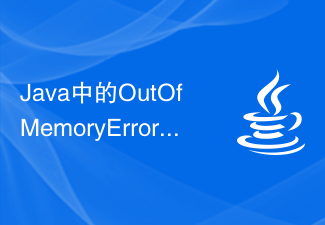 Java中的OutOfMemoryError异常常见原因是什么?Jun 25, 2023 pm 08:43 PM
Java中的OutOfMemoryError异常常见原因是什么?Jun 25, 2023 pm 08:43 PMJava是目前使用最广泛的编程语言之一,但在使用Java开发应用程序时,很容易遇到“OutOfMemoryError”异常错误,这种错误经常会给开发者带来一些挑战。究竟什么原因会导致Java中的OutOfMemoryError异常呢?接下来,我们就来详细了解一下。内存泄漏(MemoryLeak)内存泄漏是指当一个对象不能被垃圾回收器回收时,就会导致内存泄漏
 Java中的IOException异常常见原因是什么?Jun 25, 2023 am 11:22 AM
Java中的IOException异常常见原因是什么?Jun 25, 2023 am 11:22 AM在Java编程中,IOException异常是一个经常出现的异常类型。它在处理文件和网络连接等I/O操作时经常出现。本文将探讨Java中IOException异常的常见原因和解决方法。文件不存在或无法读取文件最常见的IOException异常是当试图打开一个不存在的文件或没有权限读取文件时抛出的异常。当我们使用FileInputStream或FileRead
 Java中的NoSuchFieldError异常常见原因是什么?Jun 24, 2023 pm 09:00 PM
Java中的NoSuchFieldError异常常见原因是什么?Jun 24, 2023 pm 09:00 PMJava中的NoSuchFieldError异常常见原因是什么?Java是一种跨平台的面向对象编程语言,多用于开发企业级应用程序和移动应用程序等。在Java程序开发中,NullPointerException、IndexOutOfBoundsException、ClassCastException等异常经常会出现,而NoSuchFieldError异常也是比
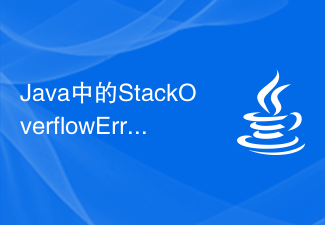 Java中的StackOverflowError异常常见原因是什么?Jun 25, 2023 am 08:19 AM
Java中的StackOverflowError异常常见原因是什么?Jun 25, 2023 am 08:19 AMJava中的StackOverflowError异常常见原因是什么?在使用Java编程时,如果程序出现了StackOverflowError异常,那么程序将会崩溃,并且输出错误信息。那么什么是StackOverflowError异常,这种异常一般发生在哪些情况下呢?今天我们就来了解一下关于Java中StackOverflowError异常的常见原因。一、什么
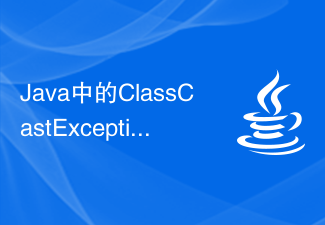 Java中的ClassCastException异常常见原因是什么?Jun 25, 2023 am 10:37 AM
Java中的ClassCastException异常常见原因是什么?Jun 25, 2023 am 10:37 AMJava中的ClassCastException异常常见原因是什么?Java语言中,ClassCastException异常是一种运行时异常,它发生在Java程序在运行时试图将一个对象强制转换为不兼容的数据类型时。在这种情况下,编译器将无法提前检查出类型不兼容的错误,而是在程序运行时抛出异常。在Java中,ClassCastException异常通常发生在以
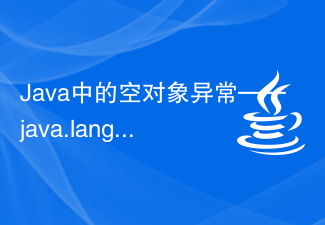 Java中的空对象异常——java.lang.IllegalArgumentException如何解决?Jun 25, 2023 pm 06:57 PM
Java中的空对象异常——java.lang.IllegalArgumentException如何解决?Jun 25, 2023 pm 06:57 PMJava中有一个非常常见的异常是IllegalArgumentException,也被称为“空对象异常”。该异常通常发生在开发者试图使用空对象调用一个方法或者进行某种操作时。本文将探讨这种异常的原因和如何处理此类异常。了解空对象异常当我们试图对空对象调用方法或使用该对象进行操作时,Java编译器会抛出IllegalArgumentException异常。例如
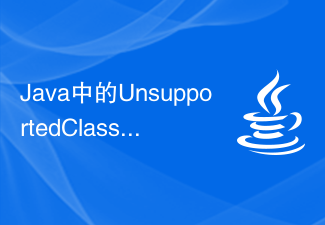 Java中的UnsupportedClassVersionError异常的解决方法Jun 25, 2023 pm 02:03 PM
Java中的UnsupportedClassVersionError异常的解决方法Jun 25, 2023 pm 02:03 PMJava是一种高级编程语言,广泛使用于企业级应用程序的开发和部署。但是,在Java开发和部署过程中,可能会遇到一些异常情况,其中之一就是UnsupportedClassVersionError异常。本文将详细解释UnsupportedClassVersionError异常的原因,并介绍如何解决这个问题。一、UnsupportedClassVersionErr
 Java中的SecurityException异常在什么场景下出现?Jun 25, 2023 pm 02:36 PM
Java中的SecurityException异常在什么场景下出现?Jun 25, 2023 pm 02:36 PMJava中的SecurityException异常是一种常见的异常类型,它通常出现在Java应用程序安全方面的处理中。这个异常通常指的是安全管理器出现问题,或者应用程序试图访问受保护的资源而未被授权的情况。本文将探讨Java中的SecurityException异常在哪些场景下会出现,以及如何在应用程序中避免这种异常的发生。首先,Java中的Security


Hot AI Tools

Undresser.AI Undress
AI-powered app for creating realistic nude photos

AI Clothes Remover
Online AI tool for removing clothes from photos.

Undress AI Tool
Undress images for free

Clothoff.io
AI clothes remover

AI Hentai Generator
Generate AI Hentai for free.

Hot Article

Hot Tools

Dreamweaver Mac version
Visual web development tools

SublimeText3 Chinese version
Chinese version, very easy to use

SAP NetWeaver Server Adapter for Eclipse
Integrate Eclipse with SAP NetWeaver application server.

Safe Exam Browser
Safe Exam Browser is a secure browser environment for taking online exams securely. This software turns any computer into a secure workstation. It controls access to any utility and prevents students from using unauthorized resources.

VSCode Windows 64-bit Download
A free and powerful IDE editor launched by Microsoft







